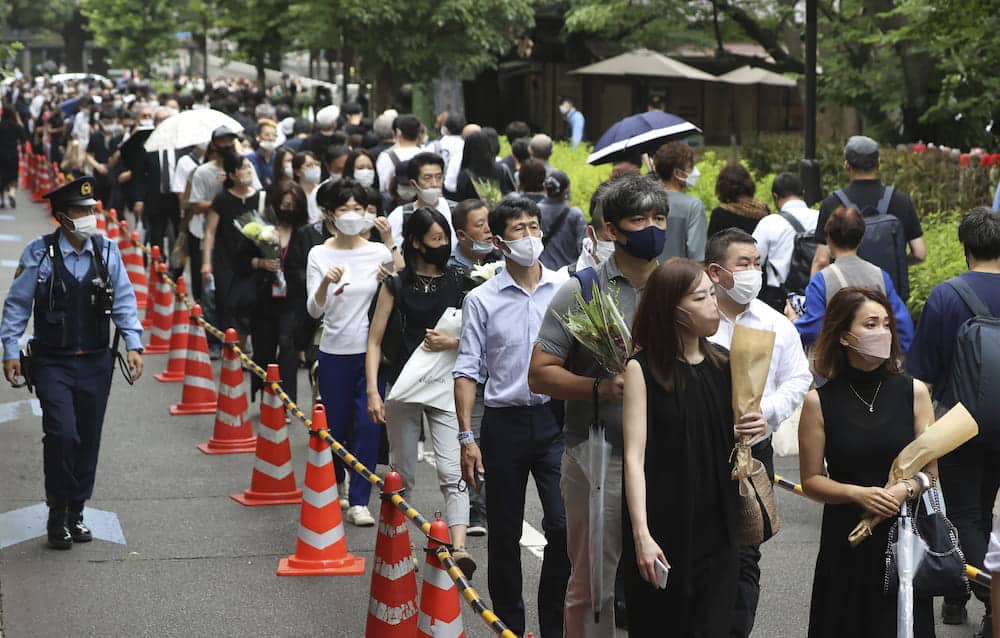With prayers, flowers and flags draped in black ribbons, Japan has said farewell to Shinzo Abe, a polarising figure who dominated politics as the country’s longest-serving premier, before being gunned down at a campaign rally last week.
Amid a heavy police presence on Tuesday, men in black suits and black ties joined women in black dresses and pearl necklaces entering central Tokyo’s Zojoji temple for the private funeral service.
Onlookers lined nearby footpaths under grey skies in oppressive summer heat, and one woman held flowers .
Hundreds had filed into the temple on Monday evening to pay their respects to Abe, who died aged 67. His killing on Friday by an unemployed man wielding a homemade gun stunned a nation where both gun crime and political violence are extremely rare.
The ceremony was closed to the media and limited to family and close friends. Abe’s widow, Akie, was chief mourner.
Following the ceremony, the hearse bearing Abe’s body will proceed through downtown Tokyo.
The procession will take in the capital’s political heart of Nagatacho, including landmarks such as the parliament building Abe first entered as a young lawmaker in 1993, after the death of his politician father, and the office from which he led the nation in two stints as prime minister, the longer from 2012 to 2020.
From early morning, long lines of people dressed in black, mixed with others in informal clothing with backpacks, formed outside the temple.
Others queued in front of ruling Liberal Democratic Party (LDP) headquarters to make offerings at a makeshift shrine that will be in place until Friday. Party staffers come out to offer cold barley tea to mourners sweating in the sultry air.
Tributes have poured in from international leaders, with US Secretary of State Antony Blinken making a brief stop en route to the United States from Southeast Asia on Monday morning to pay his respects. US Treasury Secretary Janet Yellen and Taiwan Vice President William Lai, on a private visit as a family friend, also joined mourners.
Nearly 2000 condolence messages arrived from nations around the world, Kyodo news agency said.
French leader Emmanuel Macron sent his condolences in footage posted on the country’s official presidential Twitter account after he visited the Japanese embassy in Paris.
“I remember all our meetings and work together, especially during my visit (to Japan) in 2019 … I’ve lost a friend,” said a solemn Macron.
“He served his country with great courage, and audacity.”
The suspected killer, arrested at the scene and identified by police as 41-year-old Tetsuya Yamagami, believed Abe had promoted a religious group to which his mother made a “huge donation”, Kyodo news agency has said, citing investigators.
The Unification Church, known for its mass weddings and devoted following, on Monday said the suspect’s mother was one of its members. Reuters could not determine whether the mother belonged to any other religious organisations.
Yamagami shot Abe from behind, unloading two shots from a 40cm-long improvised weapon wrapped with black tape.
Chief cabinet secretary Hirokazu Matsuno told a news conference on Tuesday the Japanese government will consider whether there is a need to further regulate handmade guns.
“We are aware that current regulations strictly restrict firearms, whether handmade or not,” he said.
Satoshi Ninoyu, head of the National Public Safety Commission, told a Tuesday news conference he had directed that a team be established to investigate the security situation around Abe’s assassination.
“We take this incident extremely seriously,” he was quoted by the Nikkei Shimbun as saying.



